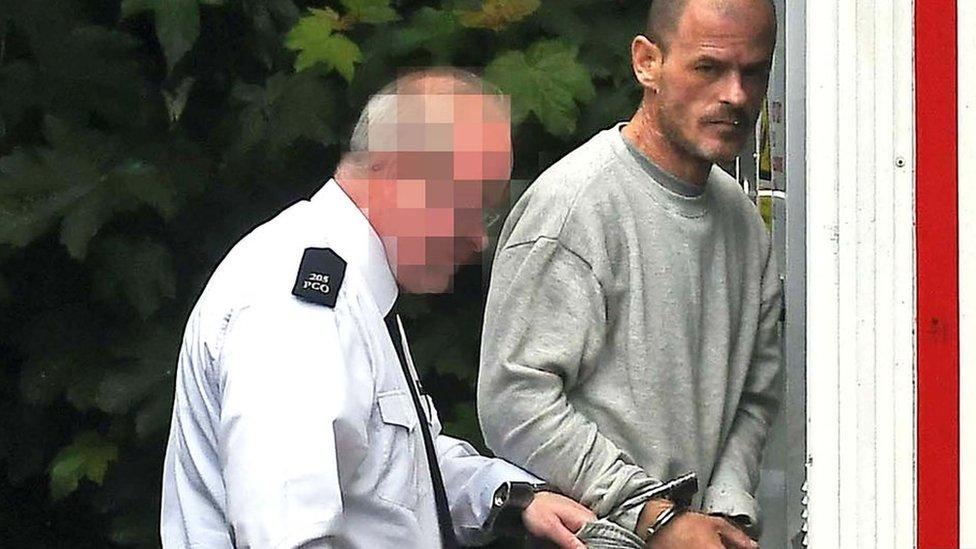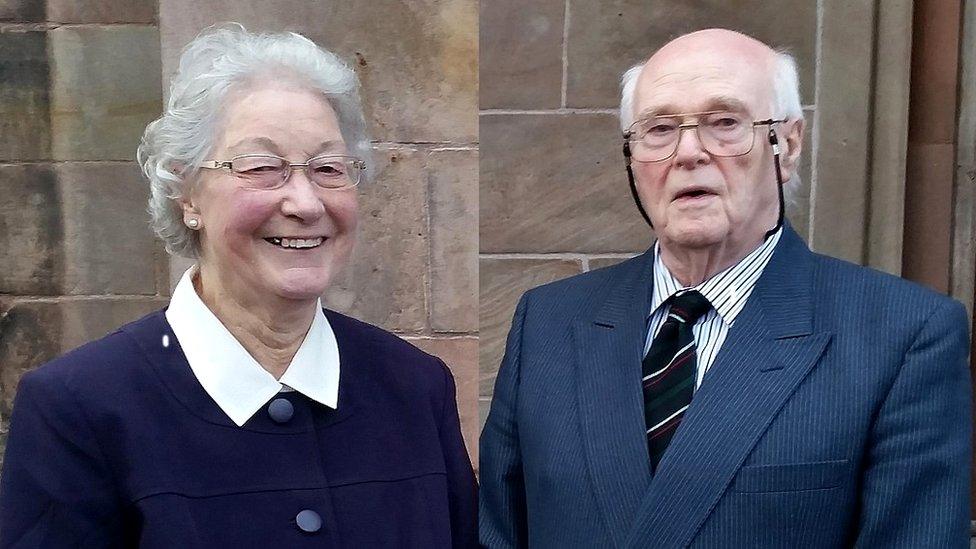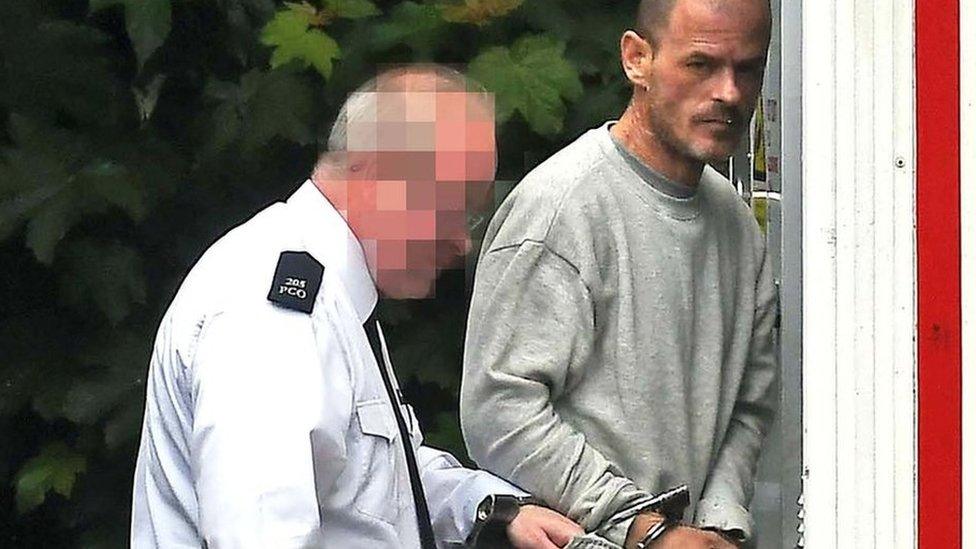Cawdery killings: Coroner will study evidence of 40 witnesses
- Published

Thomas Scott McEntee at an earlier court hearing
A coroner will study the evidence presented by 40 witnesses before making her report into the killing of an elderly couple in Portadown.
Michael and Marjorie Cawdery, both 83, were killed in a "frenzied attack" in their County Armagh home in May 2017.
Their killer, Thomas Scott McEntee, was suffering from paranoid schizophrenia. He is serving at least 10 years in prison for their manslaughter.
The inquest into the deaths concluded on Monday.
The inquest has heard that McEntee left the Emergency Department of Craigavon Area Hospital before making his way to the Cawdery home.
In the days leading up to the killings he had come to the attention of police and health services a number of times.
Throughout the inquest, witnesses have spoken of the interaction between police and health services when dealing with complicated mental health issues.
It was stated on a number of occasions during the inquest that 40% of all calls to the Police Service of Northern Ireland (PSNI) now relate to mental health issues.
The inquest has also heard, at length, about how opportunities for both the health service and PSNI to take McEntee off the streets in the days ahead of the double killing were missed, with perceived shortfalls in information sharing and a failure to take control of situations highlighted.
On Monday, the 11th day of the inquest, Coroner Maria Dougan heard evidence from four witnesses about some of the lessons learned by police and health services and the need for better training and co-operation between agencies.
Among those giving evidence was Wendy Middleton, a former PSNI District Commander for the Armagh, Banbridge and Craigavon area.
She told the coroner that new technology should help hold information about an individual "in one place", making it easy to push it to an officer in the field.
When asked about the insinuation that police had deferred control of the scene outside Daisy Hill Hospital in Newry to health staff where a naked McEntee was pinned to the ground and handcuffed, Ms Middleton said that better use of powers and equipment was required.
'Ownership at the scene'
She also said that officers should not be reluctant to use powers such as Article 130 which require them to take someone to a place of safety under the mental health order.
"It is very clear there has to be ownership at the scene and there have been improvements there," she said.
When asked if documentation should be required to enable officers to hand a patient over to clinicians she agreed.
"Yes, experts have spoken of a handover document."

Marjorie and Michael Cawdery were killed in a stabbing at their home in Portadown in 2017
Martina McCafferty is the social care lead at the Department of Health.
She told the coroner about work to create a new protocol outlining how various organisations should work together in incidents like this.
She said that she understood "the final draft of a new protocol is with the PSNI".
When asked if she felt it would deliver significant improvement in terms of integration on mental health problems, Ms McCafferty said the goal would be that "all partners are working from the same standards with improved communication".
The coroner also heard from Sgt Steven Kirkwood who oversees adult safeguarding and mental health training at the PSNI's Garnerville training college in Belfast.
He said all new recruits receive a half day module after week six, but also that some other aspects of training feature mental health scenarios.
"Students should be able to understand the mental health order and to provide assistance," he said.
Expansion of guidelines
Sgt Kirkwood added that he felt enhanced guidelines on how officers decide whether someone should be detained under Article 130 would be helpful.
"There's a balance between protecting liberty against care and control," he said.
Sgt Kirkwood also said that he understood more training that is currently delivered at a district level will be centralised through Garnerville.
Dr Patrick McMahon who has worked as a consultant psychiatrist in the Southern Trust since 2001 was the final witness.
He spoke about efforts to prevent scenarios like that in May 2017 from arising again.
Among the areas he covered related to when a patient whose address is outside the trust area is presented.
In McEntee's case this created issues.
"The trust accepts that it was incorrect advice when it was said he wasn't eligible for treatment in the Southern Trust, as he didn't have an address here," Dr McMahon said.
"There is a process of temporary registration for this.
"The refusal to accept a referral should not happen again."

McEntee was restrained by police outside Newry's Daisy Hill Hospital (above) before being taken to Craigavon Area Hospital
Dr McMahon also spoke of a change which means all those presenting on mental health grounds will receive a face-to-face assessment.
Again, this was not the case in relation to McEntee.
Coroner Maria Dougan said she would take the time to consider the evidence of "40 witnesses and voluminous reports" before presenting her findings.
"I'd also like to thank the Cawdery family for faithfully attending each day, often to hear difficult evidence," she said.
Related topics
- Published23 June 2023

- Published14 June 2023

- Published13 June 2023

- Published12 June 2023
